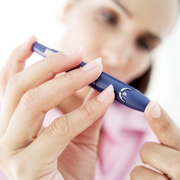Treatment
Diabetes treatment aims to maintain blood sugar at levels as close to normal as possible. Regular medical care is important for preventing or delaying complications.
Insulin
Insulin injection replaces the natural insulin the pancreas would normally produce. The dosage is adjusted based on results of blood sugar tests before meals and at bedtime. You will need to have insulin shots two, three, or more times daily. Or you may wear an insulin pump that continually gives you a small amount of insulin. The pump connects to tubing and a small needle or catheter under the skin.
Pramlintide
Amylin is made in the pancreas like insulin. In people with type 1 diabetes, this hormone is lacking, also like insulin. Researchers think that the post-meal glucose rise in people with type 2 diabetes is somehow related to the amylin deficiency. The drug pramlintide (Symlin) may be used when insulin therapy is insufficient to adequately control blood sugar.
Diet
If you have type 1 diabetes, you should meet regularly with a registered dietician. Generally speaking, it is best to:
- Follow a well-balanced meal plan incorporating a variety of food groups.
- Eat consistently at regular times each day, including a bedtime snack.
- Limit the amount of fat in the diet.
- Avoid highly refined carbohydrates (sugar or high fructose products).
Exercise
Exercise is encouraged when blood sugar levels are consistently under control and there are no complications. Follow your doctor's advice on activity levels and restrictions. You may need to adjust your insulin regimen or diet to compensate for low glucose levels linked to exercise.
Blood Sugar Testing
Checking blood sugar levels during the day helps you track the amount of glucose in your blood. Testing is easy with a blood glucose monitor. You can also ask your doctor about continuous glucose monitoring systems that you wear all day.
Keep a record of the results to show your doctor. Your treatment plan may change based on your test results. The HbA1c blood test is also used by your doctor to access your overall diabetes control.
Pancreatic Transplant
This procedure is recommended if you have:
- Severe kidney disease and need a kidney transplant at the same time as the pancreatic transplant
- Acute diabetic complications or emergencies not preventable by insulin
- Severe problems due to injecting large amounts of insulin
- Severe and frequent diabetic complications
If you are diagnosed with type 1 diabetes, follow your doctor's instructions .
Please be aware that this information is provided to supplement the care provided by your physician. It is neither intended nor implied to be a substitute for professional medical advice. CALL YOUR HEALTHCARE PROVIDER IMMEDIATELY IF YOU THINK YOU MAY HAVE A MEDICAL EMERGENCY. Always seek the advice of your physician or other qualified health provider prior to starting any new treatment or with any questions you may have regarding a medical condition. Copyright © 2024 EBSCO Publishing All rights reserved.
 World’s First Artificial Pancreas Device Goes to Boy in Australia
World’s First Artificial Pancreas Device Goes to Boy in Australia








